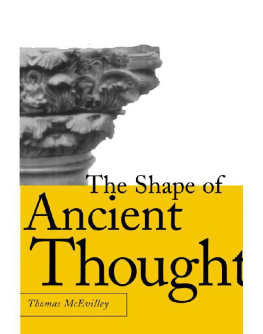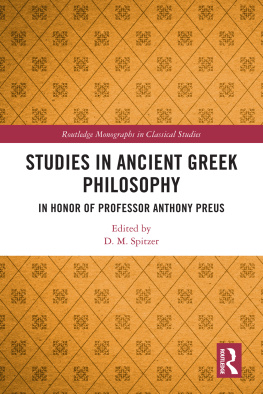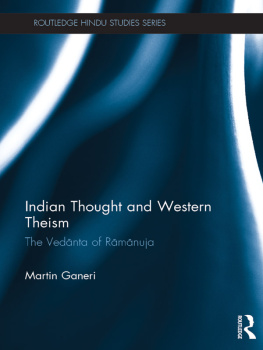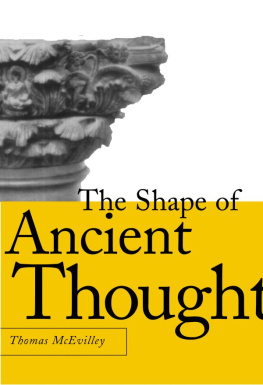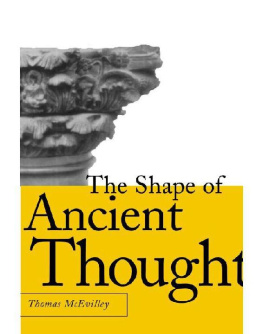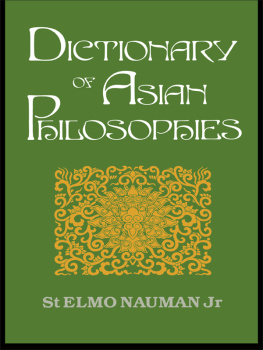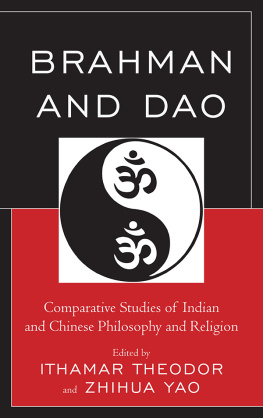The Shape of Ancient
Thought: Comparative
Studies in Greek and Indian
Philosophies Thomas McEvilley

2002 Thomas McEvilley
All rights reserved. Copyright under Berne Copyright Convention, Universal Copyright Convention, and Pan-American Copyright Convention. No part of this book may be reproduced, stored in a retrieval system, or transmitted in any form, or by any means, electronic, mechanical, photocopying, recording, or otherwise, without prior permission of the publisher.
05 04 03 02 5 4 3 2 1
Copublished with the School of Visual Arts
Published by Allworth Press
An imprint of Allworth Communications
10 East 23rd Street, New York, NY 10010
Book design by James Victore Inc., Beacon, NY
Page composition/typography by Integra Software Services, Pvt. Ltd.
Library of Congress Cataloging-in-Publication Data:
McEvilley,Thomas, 1939
The shape of ancient thought: comparative studies in Greek and Indian philosophies/Thomas McEvilley.
p. cm.
Includes bibliographical references and index.
ISBN 1581152035
1. Philosophy, Ancient. 2. Philosophy, Indic. 3. Philosophy, Comparative. I. Title.
B165 .M22 2001
180dc21
2001005510
Printed in Canada
Table of Contents
|
|
|
|
|
| S UPATAS |
| DHYAMIKA |
| DHYAMIKA |
| IKAS |
| NTIC T RADITION |
| DA B UDDHISM |
|
Editors Introduction
by Bill Beckley
Lyotard remarked that post-Modern artists often function as philosophers. They may deal with issues of metaphysics, epistemology, and ethics, as many influential critics today approach art through philosophy.
No critic has unfolded the philosophical aspect of contemporary art like Thomas McEvilley. His fluency, as Classicist and as Indologist, both in ancient and in modern thought, has shone a light on visual objects that we have contemplated for over twenty years. When I first learned that McEvilleys art criticism was adjunct to his studies in ancient philosophy, I was surprised and intrigued. Then when I saw his five-volume manuscript, The Shape of Ancient Thought, stacked in the middle of his apartment like a sculpturethis work that he began in the early seventies, his magnum opus, tracing currents of ancient philosophy that are of interest to me as an artist, nowit seemed quite natural, even an honor, to include it here within this series, Aesthetics Today. For the bottom line of this book is the beauty of ideas, or what McEvilley has called the aesthetics of thought. That was reason enough.
But more recently, events have leant an unexpected urgency to the project by focusing the worlds attention on Afghanistan (ancient Bactria), where much of the story unfolds in this volume, and where the difficult karma of cross-cultural contacts is still alive.
I first conceived this series as a way of opening aesthetics to a variety of discourses, including the then neglected creatures of beauty and the contemporary sublime. In doing so, I knew it was impossible to have protected language, an ivory tower of anythingwhether it be aesthetics or philosophy. We have seen what happens to ivory towers when the world gets in the way. It is precisely this world, with its ancient and ongoing collision of eastern and western ideologies that confronts us today. I thought The Shape of Ancient Thought would be relevant in this series. I could not have imagined then, how relevant it soon would become.
Many thanks to David Rhodes, president of the School of Visual Arts, and to Tad Crawford, publisher of Allworth Press, for their foresight in supporting this project.
-Bill Beckley, Series Editor
November 12, 2001
New York City
Acknowledgments
Several people need to be acknowledged for the generous help they gave to the author.
Through much of the 1970s, when no part of this work had yet been published and virtually no one knew of it, Edward Conze graciously read the first drafts of several chapters and offered caustic, insightful, learned comments. Late in the 1970s Frederick Streng kindly read selections, which he greeted with eager enthusiasm.
For several years in the 1980s, Dominique DeMenil contributed toward my sustenance in order to free some time from teaching for this work; her belief in the project was unwavering, in part because she saw it as contributing to the cause of ecumenism that lay behind the Rothko Chapel and others of her projects.
My warm thanks go also to Katherine Harper and Christopher Chapple, of Loyola Marymount University, both of whom have read an earlier version of this manuscript in its entirety and made useful and insightful comments on it. Juan Echeverris work with the manuscript at an earlier stage was valuable and much appreciated. Bill Beckley, the editor of this series, has been unfailingly sympathetic and supportive. Tad Crawford and his staff at Allworth Press have given generously of their time and have seemed to care intensely about the text, which made working with them an altogether positive experience.
Very special thanks must go, posthumously, both to Eric Orr, who said he would read this book if he lived long enough to see it finished (he didnt), and to James Lee Byars, who for several years cherished a copy of the manuscript of this book, which he carried about with him in two large shopping bags.
Preface
Chapters 1 through 25-the substance of the book-were written between 1970 and 2000; they deal with the subject matter indicated by the title -Comparative Studies in Greek and Indian Philosophies. The foreword and afterword were added more recently, as an afterthought; they treat various issues surrounding the subject matter in the contemporary postcolonial world. Depending on what he or she wants from this book, the reader may wish to skip them altogether or to treat them as appendixes and read them at the end, as the afterthought they are.
My title derives in part from B. N. Seals pioneering Comparative Studies in Vaishnavism and Christianity (Calcutta, 1899), which seems to be the first book about philosophy to bear the word comparative in its title, and the work which declared the basic principle: Historical comparison implies that the objects compared are of co-ordinate rank.
A Note on Citations, Translations, and Transliterations
All references to the pre-Socratics follow the numeration of H. Diels and W. Kranz, Die Fragmente der Vorsokratiker. The A fragments are testimonia from other authors; the B fragments are actual quotations from the pre-Socratics. In this book fr. Ai means an A fragment, while fr. i is a B fragment; if the identity of the author is not obvious from the context, the Diels-Kranz chapter number will be included alsosay, DK iAi or DK iBi.
In general I have kept to one source for the reference numbers of a philosopher or group of philosophers, like Diels-Kranz for the pre-Socratics. Similarly I refer to the Upanisads in the numeration of Sarvepalli Radhakrishnans translation, The Principal Upanisads, and so on, as noted here and there in the text.
Though all Greek, Latin, Sanskrit, and Pali texts have been consulted in their own languages, they are quoted in existing scholarly translations. This way, it is felt, there can be no sense that the translations have been made to serve an agenda. Thus, unless otherwise noted, the pre-Socratics are translated either as by G. S. Kirk, J. E. Raven, and M. Schofield (The Presocratic Philosophers), or as by Kathleen Freeman (Ancilla to the Presocratics); the Upanisads as by Radhakrishnan (The Principal Upanisads with occasional changes to eliminate Elizabethan forms), the R.g Veda as by Ralph T. H. Griffiths (The Hymns of the R.g-Veda), Plotinus as by Stephen MacKenna (Plotinus, The Enneads), and so on. In some cases, such as Plato and Aristotle, a variety of translations have been used, as noted.
Next page
